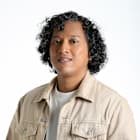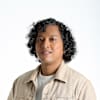Dick Lee reflects on Singlish bans, sister’s death as The Assembly returns with new conversations
A team of neurodiverse interviewers draw out public figures like Indranee Rajah and Pritam Singh in Season 2 of The Assembly. Dick Lee takes the hot seat first, sharing candid accounts such as being used as a police decoy once.
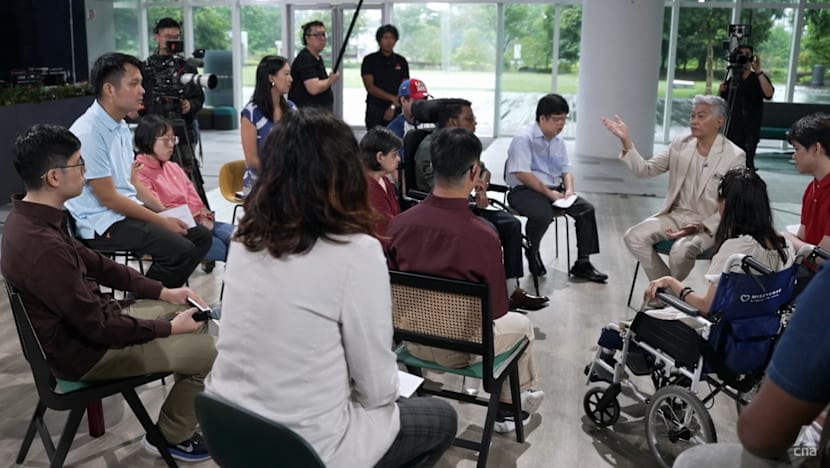
Dick Lee revisits regret and rebellion on The Assembly, among other themes.

This audio is generated by an AI tool.
SINGAPORE: In the 1970s, when “broken English” was seen in some quarters as a national embarrassment, a teenage Dick Lee dared to write Fried Rice Paradise — a cheeky anthem replete with Singlish.
Like long hair on men, it was banned on government-controlled Radio Television Singapore.
“I was hoping to write a Singapore song,” the former Singapore Idol judge recalled. “I thought, if I put Singlish (in), it would make it sound Singaporean.”
The bans are now a well-known part of Singapore’s cultural history, but the question is, was he angry with the government, asked 28-year-old Joel Lee on The Assembly, CNA’s interview series featuring neurodivergent participants in the role of journalists.
“I was confused,” the 69-year-old replied. “It made me feel that being Singaporean isn’t good. It’s not good to express myself as a Singaporean.”
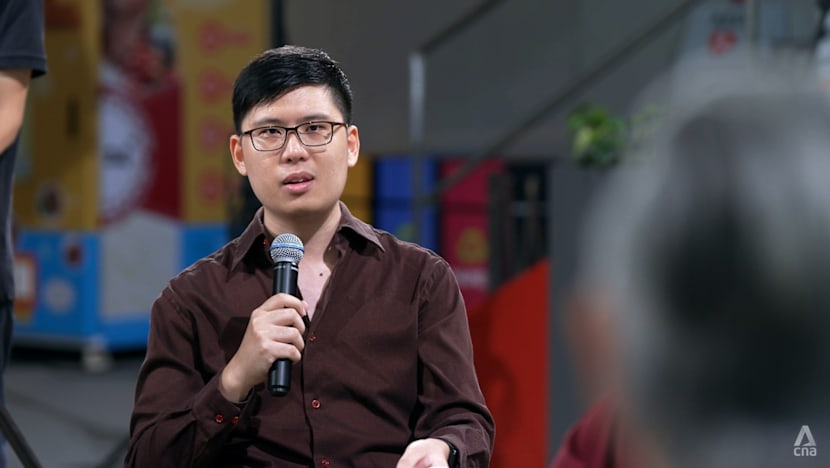
It would be 15 years before he tried again with Rasa Sayang, a rap song spiced with Singlish. It too was rejected. And he thought: “When are we ever going to accept who we are?”
But the tide was turning. His songs found support on the ground, newspapers began defending Singlish and the ban was lifted after a few weeks.
The next question for him turned the conversation from rebellion to regret. “For a very long time, you blamed yourself for (your sister’s death). Why is that?” asked Stephanie Fam, 40, who has cerebral palsy.
He replied: “Indirectly, I had something to do with it.”
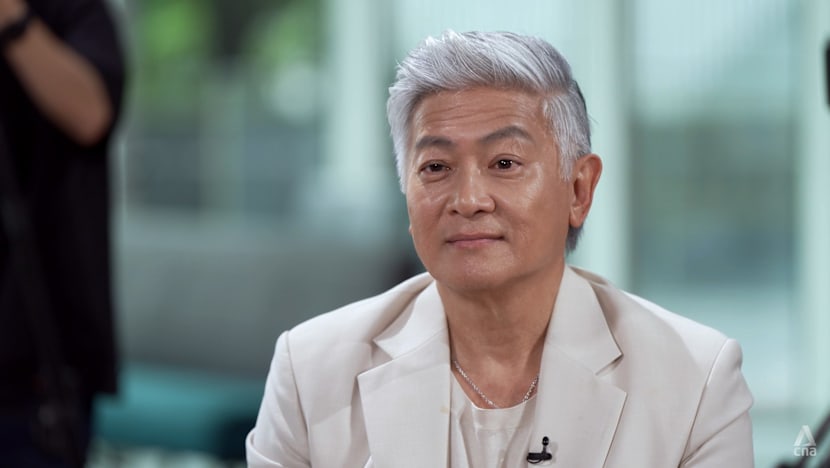
As he was turning 26, caught up in running his new company, he did not have a birthday party for the first time in 12 years.
So his mother invited his sister and her fiance over to Cameron Highlands for a holiday instead. On the way there, the couple’s car hit a bus. His sister died — a day before his birthday.
“If I had my party, … maybe they’d still be around,” he said, pausing before adding: “Since then, I’ve had my birthday party without fail.”
Part confessional, part cultural reckoning — inspired by France’s Les Rencontres Du Papotin (The Meetings Of Papotin) — The Assembly pairs public figures with a team of interviewers with conditions such as Asperger’s syndrome, autism, dyslexia and more.
They ask the questions few others may dare to, with Cabinet minister and Leader of the House Indranee Rajah, Leader of the Opposition Pritam Singh and actress-model Sheila Sim also taking the hot seat this season, which premieres on Wednesday.
WATCH: Dick Lee answers hard questions from neurodivergent ‘journalists’ (29:26)
FROM O-LEVEL FAILURE TO MARITAL MISTAKE
The first guest grew up surrounded by privilege and piano keys. Dick Lee was the eldest of five children born to sixth-generation Peranakan businessman Lee Kip Lee — a former president of the Peranakan Association — and his wife, Elizabeth.
Did he think he would have been successful had he not been “born rich”, asked Durkeswaran Krishnan, 19.
“I don’t know whether (being) born rich or poor has got anything to do with it,” he responded. “I’d say … one thing that’s helped me is that I didn’t have to support my family.”
Still, he insisted, he would have pursued music regardless. What changed his life was him failing his O-levels — on purpose, he shared. “I put myself out of that academic route and forced myself to find my own way.”
That meant starting work at age 17, producing music, choreographing fashion shows and moving out of the house. He was self-sufficient by then.
LISTEN: How Dick Lee shaped the Singapore sound
Privilege may have helped him get out of trouble during his schooldays, however, when he became a middleman selling pornographic books to schoolmates at St Joseph’s Institution.
“I was quite naughty,” he admitted. “My dad saved my ass … from getting expelled. I have a feeling he donated some money to the school.”
The police also got involved, using him as a decoy to catch the supplier. His eventual punishment was to sit outside his classroom for a week.
“Ironically, everybody heard this story in the whole school, and when they walked past my class and they saw me sitting (outside), I was like their hero,” he laughed.
“But I learnt my lesson — don’t play around with this kind of thing.”
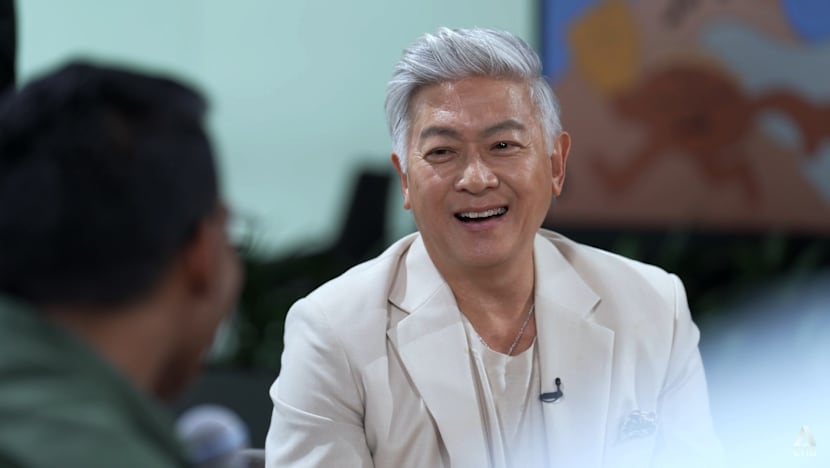
It was one of “many times” his father would be disappointed in him. A conservative Lee Kip Lee often fretted over the viability of a career in music, which was then considered an almost “hopeless” profession, the son recounted.
But that became its own motivator for Dick Lee, who “spent a lot of (his) career” proving he could be successful.
Of the many questions he fielded, there was one that Trevor Lee, 25, who has an autism spectrum disorder, prefaced with “please don’t hate me for asking you this”. It was about his divorce in 1997 from singer-actress Jacintha Abisheganaden.
He answered wryly: “You should ask, how did we (end up in) marriage in the first place?”
She was his best friend from his secondary schooldays. They married in 1992, and “simply put, it was a mistake”. “We were very optimistic,” he said. “But I guess sometimes friends should just stay friends.”
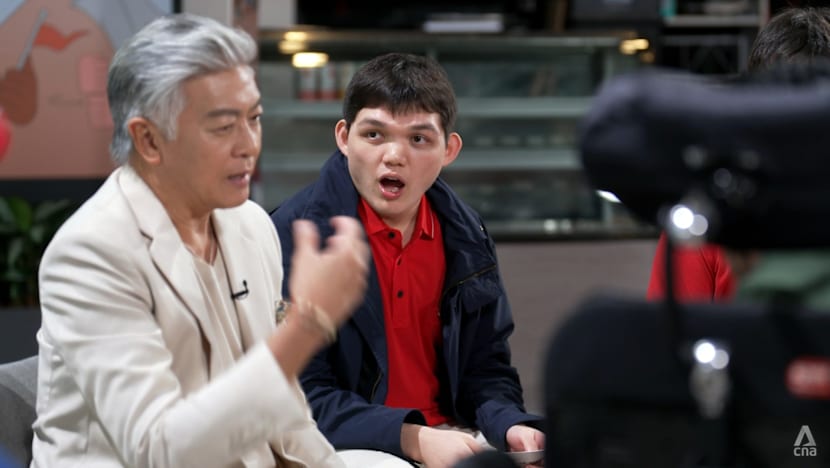
The saddest part for him was that their relationship “sort of” soured. “She was my muse. I wrote all my … early songs for her,” he said. “I still feel (she) has the most beautiful voice in Singapore.”
The “exciting secret news” is that they may soon be collaborating again, he said as he also shared his secret dislike for performing and his latest passion project celebrating Singaporean identity.
EXPECT MORE EMOTION, POINT-BLANK QUESTIONS
No topic was off-limits in the other episodes either. “People should watch Season 2 because it’s much more touching,” Trevor Lee said. “(The guests) talked a lot about their families — and that almost got me into tears a little.”
One such moment came when Indranee opened up about the loss of her mother in August. With her father and siblings also gone, she spoke about learning to live with absence.
“You can’t just sort of say, let’s get everything back to normal and do everything exactly as it was before straightaway,” Indranee said.
“Gradually, the sadness passes away. And what’s left behind is the love and the happy memories. And that’s the place that you want to be in.”
For 34-year-old Jireh Ko, a new addition to the team, the season has been an eye-opener.
“It has also made us … understand ourselves better because a lot of the times when we ask these questions, they’re also related to parts of our life,” he said.
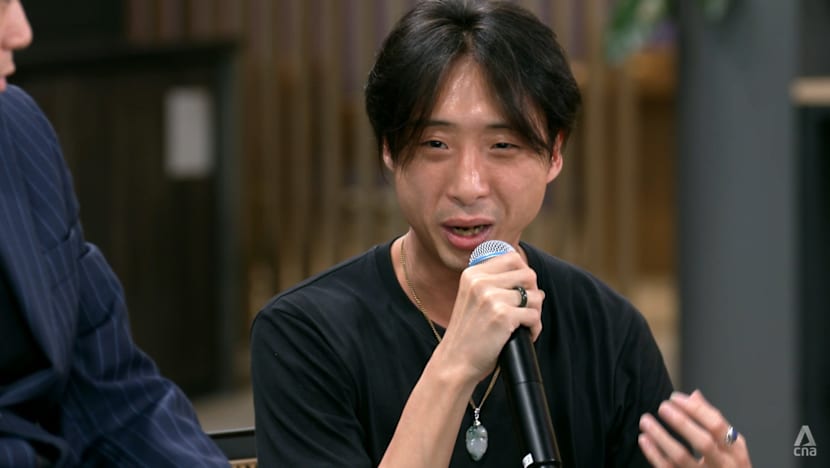
That emotional resonance was palpable when Sim spoke of feeling lonely during a childhood marked by her parents’ divorce.
“For a very, very big part of my life, I felt alone … (owing to a) lack of love and that lack of connection on a deep level,” she reflected.
Among the participants, Joel Lee had struggled to make friends at school, and he told her: “I can quite relate to … your story. I’m comforted by that, so I thank you for that.”
This season also showcases the growth of The Assembly’s interviewers, who have worked on their skills since the show’s debut in January. “I was excited because I wanted to test myself in terms of my level of questioning,” said Fam.
Having also learnt how to deal with viewer criticism of her questions through this season’s workshops, she added: “It helped me grow as a journalist.”
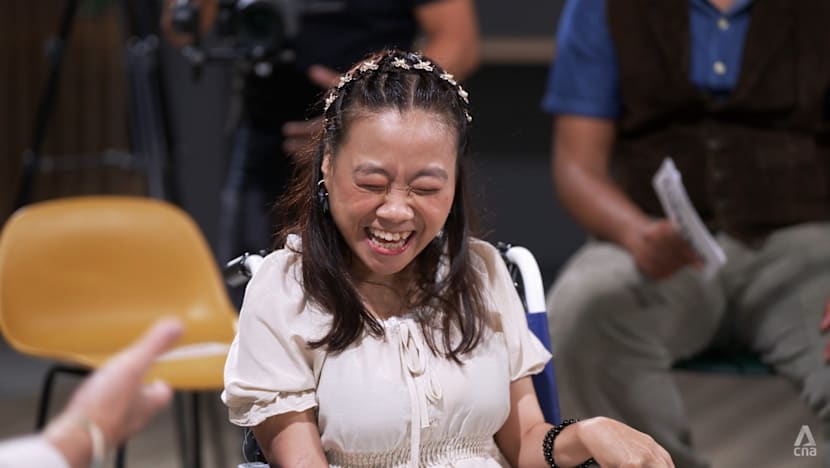
In the third episode, she went on to ask Singh point-blank why he had joined the Workers’ Party instead of the People’s Action Party, eliciting the response, “Wow, that’s an intense question.”
“It’s always interesting to see how people see the world — what’s at the back of their mind when they’re asking you a question and then for them to verbalise the question,” Singh said of his session. “I like that engagement.”
Watch this episode of The Assembly here. Catch the rest of this CNA series at 9pm on Wednesdays.









